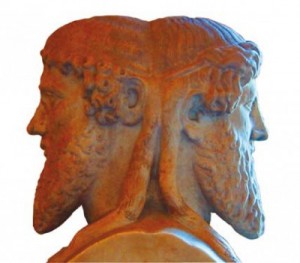Be Two-Faced… At Least this Week!
 The Roman god Janus had two faces, facing in different directions, so he could see what was coming and what was going. The Romans named the first month of the year, January, in his honor. Perhaps it might have been more appropriate to have named just this week January, for the end of the year, and the beginning of the New Year, occasions much reflection upon what is passed, and looking ahead to expectation to what is coming.
The Roman god Janus had two faces, facing in different directions, so he could see what was coming and what was going. The Romans named the first month of the year, January, in his honor. Perhaps it might have been more appropriate to have named just this week January, for the end of the year, and the beginning of the New Year, occasions much reflection upon what is passed, and looking ahead to expectation to what is coming.
There are other times of life when this happens, of course. When contemplating marriage, when starting a new job, when turning in a resignation, as children are born, as beloved pass away; these are all natural occasions of reflection. We take stock of what has happened, we prepare for what is to come.
Certainly, any American will be familiar with the Scottish custom of singing “Auld Lang Syne”: Should old acquaintance be forgot, and never brought to mind ? Should old acquaintance be forgot, and old lang syne? For auld lang syne, my dear, for auld lang syne, we’ll take a cup of kindness yet, for auld lang syne.
The end of the year, particularly lends itself to lugubrious thoughts, thoughts of “what if?” The Spaniards call New Years Eve “nochevieja” or “old night,” and Spanish literary history is filled with essays and journal entries in which the authors call to mind what might have been. The Germans, in honor of the saint of the day, “St. Sylvester,” call New Year’s Eve “Silvesterabend.” It is not uncommon, in Germany and Spain, for Churches to hold Holy Hours on New Year’s Eve, in the afternoon or evening, so that people might pray in reparation for their past mistakes, and ask God’s guidance for the future.
The custom of making New Year’s resolutions certainly is a way we show hope for the future. In the midst of the Winter cold — or in Australia, summer heat — we look ahead to ways we might become better. Customs such as kissing as the clock strikes the New Year, eating herring or black eyed peas, or visiting various and sundry friends to greet them in the New Year, are all ways in which we express hope for the New Year.
The Church has two indulgenced customs for this time of year. The Te Deum, the Church’s great hymn of thanksgiving ascribed to St. Ambrose, may be prayed or chanted on New Year’s Eve.
O God, we praise Thee, and acknowledge Thee to be the supreme Lord.
Everlasting Father, all the earth worships Thee.
All the Angels, the heavens and all angelic powers,
All the Cherubim and Seraphim, continuously cry to Thee:
Holy, Holy, Holy, Lord God of Hosts!
Heaven and earth are full of the Majesty of Thy glory.
The glorious choir of the Apostles,
The wonderful company of Prophets,
The white-robed army of Martyrs, praise Thee.
Holy Church throughout the world acknowledges Thee:
The Father of infinite Majesty;
Thy adorable, true and only Son;
Also the Holy Spirit, the Comforter.
O Christ, Thou art the King of glory!
Thou art the everlasting Son of the Father.
When Thou tookest it upon Thyself to deliver man,
Thou didst not disdain the Virgin’s womb.
Having overcome the sting of death, Thou opened the Kingdom of Heaven to all
believers.
Thou sitest at the right hand of God in the glory of the Father.
We believe that Thou willst come to be our Judge.
We, therefore, beg Thee to help Thy servants whom Thou hast redeemed with Thy
Precious Blood.
Let them be numbered with Thy Saints in everlasting glory.
V. Save Thy people, O Lord, and bless Thy inheritance!
R. Govern them, and raise them up forever.
V. Every day we thank Thee.
R. And we praise Thy Name forever, yes, forever and ever.
To greet the New Year, the Veni Creator Spiritus might be prayed “Veni creator spiritus, mentes tuorum visita, imple superna gratia quae tu creasti pectora.” We, of course, might prefer to sing or pray the more familiar translation, looking, of course, for a translation which translates all seven stanzas “Come Holy Ghost, Creator Blest, And in our hearts take up Thy rest; Come with Thy grace and heav’nly aid, To fill the hearts which Thou hast made.”
My prayer for you is that, during this week of transition, you may approach our dear Lord with confidence. Thank him for the goodness he has brought you this past year, while acknowledging your shortcomings. Ask him for the confidence to follow his guidance and grace in the New Year. As you look back on them on the month of December, ahead to the month of January, contemplate the past with thanksgiving and the future with hope.

